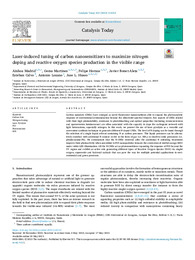Por favor, use este identificador para citar o enlazar este ítem:
https://hdl.handle.net/11000/35637
Laser-induced tuning of carbon nanosensitizers to maximize nitrogen doping and reactive oxygen species production in the visible range
Título :
Laser-induced tuning of carbon nanosensitizers to maximize nitrogen doping and reactive oxygen species production in the visible range |
Autor :
Madrid, Ainhoa
Martinez, Gema
Hornos, Felipe
Bonet Aletá, Javier 
Calvo, Estevan
Lozano, Antonio
Hueso, José L.  |
Editor :
Elsevier |
Departamento:
Departamentos de la UMH::Agroquímica y Medio Ambiente |
Fecha de publicación:
2023-10-01 |
URI :
https://hdl.handle.net/11000/35637 |
Resumen :
Carbon nanodots (CNDs) have emerged as novel fluorescent nanosensitizers able to expand the photocatalytic
response of conventional semiconductors beyond the ultraviolet spectral window. Key aspects of CNDs related
with their high photostability, resistance to photobleaching and optical properties (including downconversion
and upconversion luminescence) are often associated with the capacity to dope the carbogenic network with
light heteroatoms, especially nitrogen. In this work, we present the use of laser pyrolysis as a versatile and
convenient synthesis technique to generate different N-doped CNDs. The level of N doping can be tuned through
the selection of a single liquid solvent containing N as carbon precursor. This liquid precursor can be alternatively
enriched with additional N sources co-fed in the form of gas (i.e. NH3) or disolved solid precursors (i.e.
phtalocyanine-Ph). We demonstrate that the N-CNDs retrieved after the additional N cofeeding treatments
improve their photoactivity when assembled to P25 nanoparticles towards the conversion of methyl orange (MO)
under white LED illumination. All the N-CNDs act as photosensitizers expanding the response of P25 beyond the
UV region and exhibit an active role generating different types of Reactive Oxygen Species (ROS) via singlet
oxygen, superoxide and hydroxyl radicals that can pave the way for multiple potential applications in environmental
and green processes.
|
Palabras clave/Materias:
Carbon Dots
Nitrogen doping
Laser Pyrolysis
P25
Photocatalysis
ROS |
Área de conocimiento :
CDU: Ciencias puras y naturales |
Tipo de documento :
info:eu-repo/semantics/article |
Derechos de acceso:
info:eu-repo/semantics/openAccess
Attribution-NonCommercial-NoDerivatives 4.0 Internacional |
DOI :
https://doi.org/10.1016/j.cattod.2023.114214 |
Publicado en:
Catalysis Today, Volume 422, 1 October 2023, 114214 |
Aparece en las colecciones:
Artículos Agroquímica y Medio Ambiente
|
 La licencia se describe como: Atribución-NonComercial-NoDerivada 4.0 Internacional.
La licencia se describe como: Atribución-NonComercial-NoDerivada 4.0 Internacional.
 La licencia se describe como: Atribución-NonComercial-NoDerivada 4.0 Internacional.
La licencia se describe como: Atribución-NonComercial-NoDerivada 4.0 Internacional.
.png)
